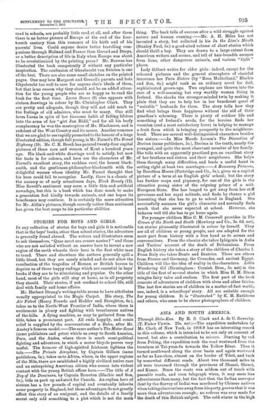STORIES FOR BOYS AND GIRLS.
IN any collection of stories for boys and girls it is noticeable that in the boys' hooks, other than school stories, the adventure is generally found abroad. The writers and illustrators seem to ask themselves, "Quae caret ora cruore nostro P" and those who are not satisfied without an answer have to invent a new region of the earth wherein their hero is the first white man to tread. There and elsewhere the authors generally spill a little blood, but they are sanely minded and do not allow the recollection of the tragedies of Roman or British heroes to deprive us of those happy endings which are essential in boys' books if they are to be stimulating and popular. On the other hand, most of the girls still stay at home, as in all propriety they should. Their stories, if not confined to school life, still deal with family and home affairs.
Mr. Herbert Strang's writing-table seems to have attributes usually appropriated to the Magic Carpet. His story, The Air Patrol (Henry Frowde and Hodder and Stoughton, 6s.), takes us to the North-West Frontier of India, where there is excitement in plenty and fighting with treacherous natives of the hills. A flying machine, as may be gathered from the title, takes a prominent part. All ends happily, and comic relief is supplied by the conversations of a Babu, after Mr. Anstey's famous model.—The same author's The Motor Scout (same publishers and price) whirls us away to South America, Peru, and the Andes, where there is much semi-political fighting and adventure, in which a motor bicycle proves very useful. The humour of high-spirited Irishmen lightens the tale.—The Private Aeroplane, by Captain Gillson (same publishers, 5s.), takes us to Africa, where, in the upper regions of the Nile, there are established a highly civilized native race and an enterprising American citizen who comes into violent contact with the young British officer hero.--The title of A Boy of the Dominion, by Captain Brereton (Blackie and Son, $s.), bids us pack up and start for Canada. An orphan hero of sixteen has a few pounds of capital and eventually inherits some property in England, but these advantages do not greatly affect this story of an emigrant, and the details of a family secret only add something to a plot which is not the main
thing. The book tells of success after a wild struggle against nature and human cunning.—Mr. A. H. Miles Las not invented a story, but collected in his In the Lion's Mouth (Stanley Paul, 5s.) a good-sized volume of short stories which should thrill a boy. They are drawn to a large extent from American writers and scenes, and tell of hair-breadth escapes from lions, other dangerous animals, and various " tight " places.
Lady Gilbert writes for elder girls : indeed, except for the coloured pictures and the general atmosphere of cheerful innocence her Twin Sisters (by "Rosa Mulholland," Blackie and Son, 6s.) might rank as an ordinary novel for dull, sophisticated grown-ups. Two orphans are thrown into the care of a well-meaning but very worldly woman living in Ireland. She shocks the stronger-minded twin by making it plain that they are to help her in her beneficent quest of " suitable " husbands for them. The story tells how they find what brings them happiness without the aid of their guardian's scheming. There is plenty of outdoor life and something of Ireland's needs, for the heroine finds her vocation (and a most satisfactory lover) in helping to manage a fruit farm which is bringing prosperity to the neighbour- hood. There are several well-distinguished characters besides the sisters.—In Miss Maude Leeson's The Discretion of Decima (same publishers, 5s.), Decima is the tenth, nearly the youngest, and quite the most observant member of her family. She tells with an apparently practised pen an excellent story of her brothers and sisters and their neighbours. She helps them through many difficulties, and lends a useful hand in setting right at least two marriages.—A Runaway Princess, by Dorothea Moore (Partridge and Co., 5s.), gives us a capital picture of a term at an English girls' school; but the story has further scope and piquancy, for one of the girls is the attractive young sister of the reigning prince of a mid- European State. She has longed to get away from her stiff governess and her royal solitude, and finds by chance a girl lamenting that she has to go to school in England. She successfully assumes the girl's character and naturally finds much that she never expected at school. However, she behaves well till she has to go home again.
For younger children Miss C. M. Cresswell provides in The Crown of the North and South (Mowbray and Co., 3s. 6d. net), ten stories pleasantly illustrated in colour by herself. They are all of children or young people, and are adapted for the most part from history with a free hand as to scenes and conversations. From the classics she takes Iphigenia in Attila and Tacitus' account of the death of Britannicus. From English history she takes a story of the children of Charles L From Italy she takes Dante and Beatrice. There are others from France and Germany, the Crusades, and ancient Egypt. Children will like the idea of reality in the characters. Little Wandering Gil (Birmingham : Cornish Bros., 5s. net) is the title of the first of several stories in which Miss H. M. Dixon mingles fairy tales and realism. The first part of the book consists of adventures of children with elves and other fairies. The last few stories are of children in a matter-of-fact world ; one, indeed, is a schoolboys' story. All are suitable enough for young children. It is "illustrated" by K. M. Rathbone and others, who seem to be clever photographers of children.






































































 Previous page
Previous page